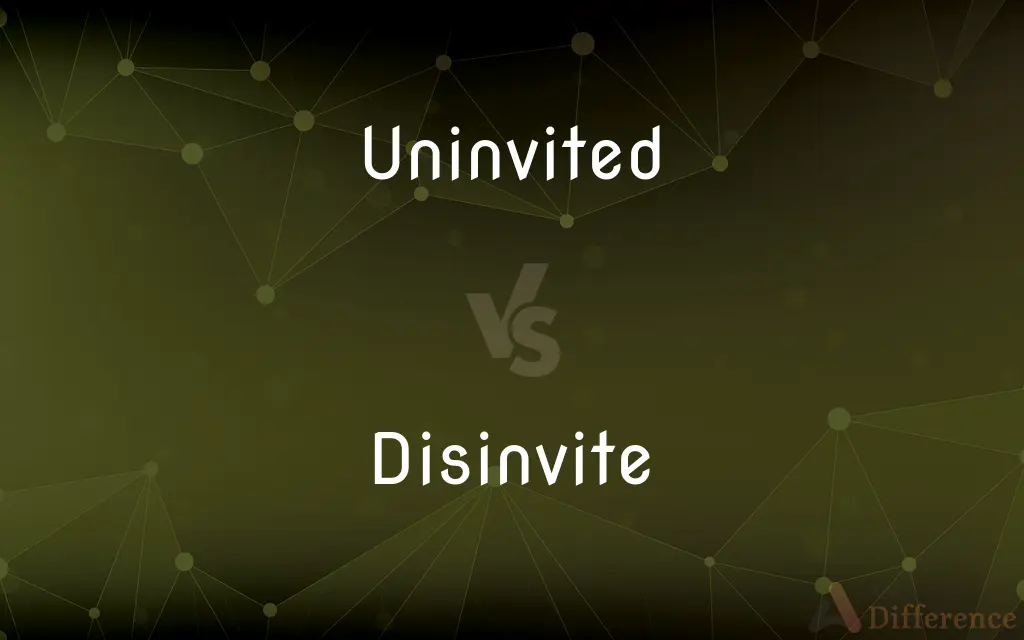Uninvited vs. Disinvite — What's the Difference?
By Maham Liaqat & Urooj Arif — Updated on March 25, 2024
Uninvited refers to not being asked to attend, while disinvite means being asked not to come after an initial invitation.

Difference Between Uninvited and Disinvite
Table of Contents
ADVERTISEMENT
Key Differences
Uninvited guests or participants have not received an invitation to an event, implying they were never considered in the planning or guest list. On the other hand, to disinvite someone means that the person was initially invited but later told they are no longer welcome to attend, often due to changed circumstances or reconsiderations.
The term uninvited often carries a passive implication, suggesting the absence of an action (the act of inviting). Whereas disinvite is an active process, involving the retraction of an already extended invitation, indicating a deliberate decision by the host or organizer.
Uninvited can also imply a broader range of contexts beyond social events, such as being excluded from conversations, projects, or opportunities without ever being considered. In contrast, disinviting is specifically related to an explicit reversal of an invitation, usually pertaining to events or gatherings.
The use of uninvited can sometimes carry a neutral or less personal tone, as it may simply indicate the lack of an invitation due to oversight or irrelevance. Disinviting, however, is often perceived as a more negative or personal action, as it directly communicates to someone that their presence is no longer desired.
Both terms reflect aspects of social etiquette but differ in their phase of engagement with the invitee. Being uninvited is a non-action from the outset, while disinviting involves altering an existing social agreement, which can lead to awkwardness or discomfort.
ADVERTISEMENT
Comparison Chart
Definition
Not receiving an invitation
Being asked not to come after being invited
Implication
Passive exclusion
Active exclusion
Context
Broader, beyond just events
Specific to events or gatherings
Tone
Neutral or less personal
More negative or personal
Social Etiquette
Reflects absence of invitation
Involves changing an existing invitation
Compare with Definitions
Uninvited
Not having received an invitation.
She felt uninvited to the team meetings, never receiving a calendar invite.
Disinvite
To ask someone not to attend after an initial invitation.
After the argument, he was disinvited from the wedding.
Uninvited
Exclusion from conversations or projects.
They were uninvited from the project discussions, leading to confusion about their roles.
Disinvite
Pertains to gatherings from which the invitation is withdrawn.
She was disinvited from the conference after the agenda was revised.
Uninvited
May not imply deliberate exclusion.
The email was sent to a limited list, leaving some colleagues feeling uninvited by oversight.
Disinvite
Modifies a previously established social agreement.
The organization had to disinvite several attendees due to changing event protocols.
Uninvited
Not being asked to attend a party or gathering.
Feeling uninvited, he decided not to crash the neighborhood BBQ.
Disinvite
The decision to retract an invitation.
The host disinvited the guest due to unforeseen venue capacity issues.
Uninvited
Not considered from the start.
New members felt uninvited to the annual company retreat, not appearing on the original guest list.
Disinvite
Implies a direct action to exclude.
Being disinvited from the gala left her feeling personally rejected.
Uninvited
(of a person) arriving somewhere or acting without having been asked
Their privacy was disrupted by a series of uninvited guests
Disinvite
To rescind an invitation to
Disinvited our friends for dinner because of an emergency.
Uninvited
Not invited or welcome
Uninvited guests.
Disinvite
(transitive) To cancel an invitation to (someone).
Uninvited
Not wanted or encouraged
The uninvited attentions of a classmate.
Uninvited
Involuntary or spontaneous
An uninvited memory.
Uninvited
Not invited.
Uninvited
Simple past tense and past participle of uninvite
Uninvited
Without being invited;
An unwanted intrusion
Uninvited guests
Uninvited
Not invited
Common Curiosities
What does it mean to be uninvited?
Being uninvited means not receiving an invitation, indicating one was not considered or included from the start.
Is it common to disinvite people?
Disinviting people is less common and can be considered a delicate matter, often requiring tactful communication due to its potentially negative connotations.
How should one handle being disinvited?
Handling being disinvited gracefully involves accepting the decision respectfully, understanding there may be reasons beyond personal differences, and maintaining composure.
Does uninvited mean you are not welcome?
Not necessarily; being uninvited often simply means you were not included in the invitation process, which could be due to oversight or irrelevance rather than a statement about your welcome.
Is it rude to attend if you're uninvited?
Attending an event when uninvited is generally considered inappropriate or rude, as it disregards the host's wishes and event planning.
What's the difference between not invited and uninvited?
"Not invited" and "uninvited" are often used interchangeably, but "uninvited" can emphasize the absence of an invitation more strongly.
Can you be uninvited from a public event?
Being uninvited typically implies a lack of personal invitation; public events generally do not involve personal invites, so the term might not apply in the same way.
What does disinvite mean?
Disinvite means being asked not to attend an event after initially receiving an invitation, often due to a change in circumstances.
Can businesses disinvite customers?
Yes, businesses can disinvite customers from events, services, or premises, usually due to policy violations or security concerns.
What to do if you accidentally disinvite someone?
If someone is accidentally disinvited, rectifying the mistake with an apology and reissuing the invitation, if appropriate, can help mend the situation.
Is there a formal way to disinvite someone?
Formally disinviting someone usually involves direct communication, ideally in private, and, if applicable, an explanation to minimize hurt feelings.
Why might someone be disinvited?
Reasons for disinviting someone can include logistical changes, interpersonal conflicts, or revised event scopes and goals.
Can disinviting affect relationships?
Yes, disinviting someone can strain or damage relationships, requiring sensitive handling and, if possible, a clear explanation.
Is being uninvited a passive experience?
Yes, being uninvited is passive, as it involves no active communication or decision conveyed to the individual about not being included.
Share Your Discovery

Previous Comparison
Soft vs. Supple
Next Comparison
Fowl vs. ChickenAuthor Spotlight
Written by
Maham LiaqatCo-written by
Urooj ArifUrooj is a skilled content writer at Ask Difference, known for her exceptional ability to simplify complex topics into engaging and informative content. With a passion for research and a flair for clear, concise writing, she consistently delivers articles that resonate with our diverse audience.














































